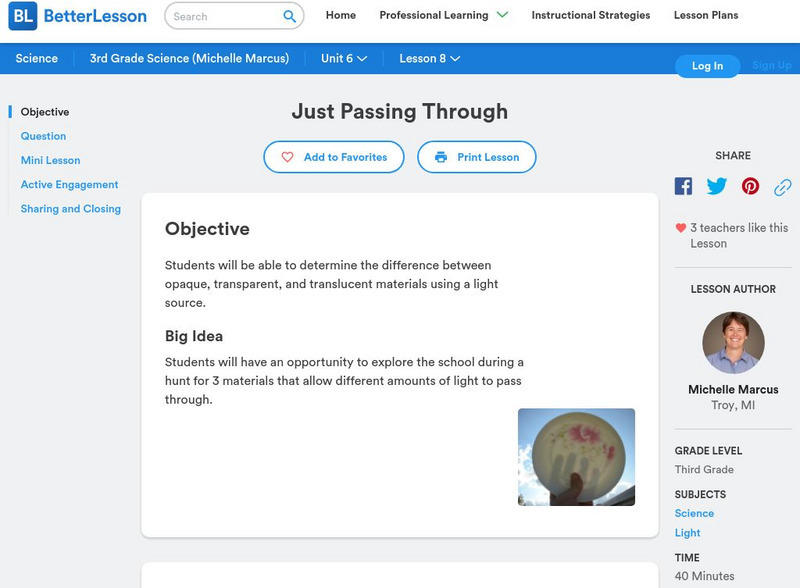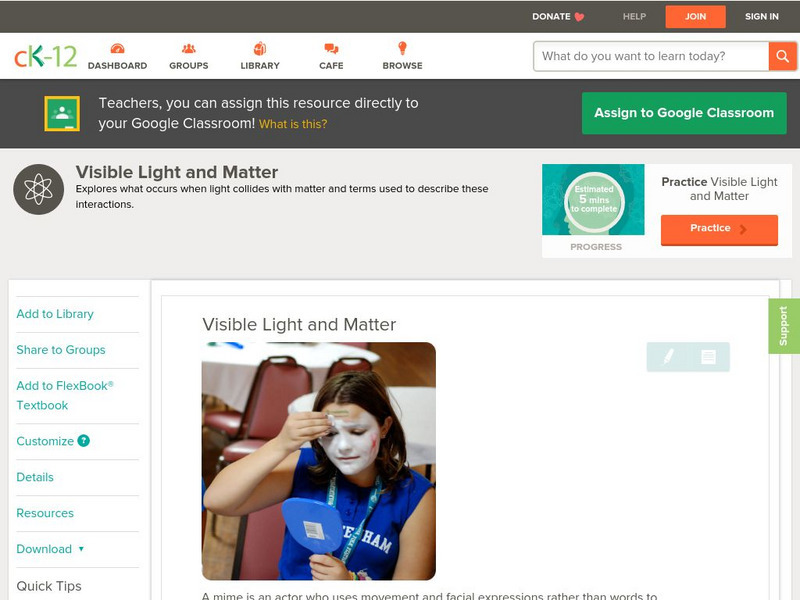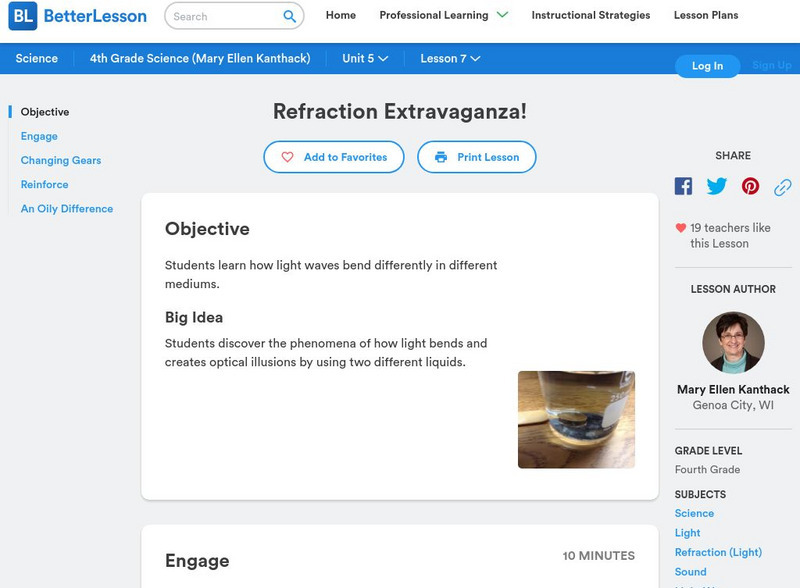University of St. Andrews (UK)
University of St. Andrews: Special Relativity
A historical approach to special relativity, giving all the events and names in the history of discovery of special relativity. Many links to these individuals.
The Wonder of Science
The Wonder of Science: 1 Ps4 2: Illumination and Darkness
This NSTA vetted source includes resources to allow students to make observations that prove objects in darkness need light to be illuminated. Included are assessment ideas, videos, examples, lesson plans, and photos of student work.
Better Lesson
Better Lesson: Just Passing Through
Students will have an opportunity to explore the school during a hunt for 3 materials that allow different amounts of light to pass through. Included in this lesson are videos showing the lesson in progress, examples of students' work,...
Other
Ward's Science: Will the Light Shine?
Students will determine the effect of placing objects made with different materials in the path of a beam of light. This lesson includes background information, guiding questions, directions, and a chart to record data.
The National Gallery (UK)
National Gallery, London: Festival of Light
Follow this museum trail and discover through seven paintings how different cultures have used light as a form of symbolism in their work.
NC State University
Ncsu.edu: Adventures of the Agronauts
This site is an online science curriculum on how to grow plants on the Moon. There are six lessons that have a glossary also included. There are movies that demonstrate concepts, and teacher resources. The sites topics cover, the Earth,...
NC State University
Adventures of the Agronauts
Come along with the Agronauts and discover space in order to report back to Commander Spud Goodroot. Fun site provides all types of information about space science! Various missions include: 'What's In Our Sky?', 'The Root of the...
E-learning for Kids
E Learning for Kids: Science: North Sea: Why Do We Need Light?
Frederik is doing experiments about light to find out how it helps people to see things.
CK-12 Foundation
Ck 12: Physical Science: Visible Light and Matter
[Free Registration/Login may be required to access all resource tools.] How visible light interacts with matter and classifying matter in terms of light.
TED Talks
Ted: Ted Ed: Is Light a Particle or a Wave?
In this third part of his series on light and color, Colm Kelleher discusses wave-particle duality and its relationship to how we see light and, therefore, color. [4:23]
CK-12 Foundation
Ck 12: Electromagnetic Spectrum
[Free Registration/Login may be required to access all resource tools.] Students learn what an electromagnetic wave is, gain a feel for the main parts of the spectrum, and work on problems involving basic properties of electromagnetic...
CK-12 Foundation
Ck 12: First Grade Science: How Do I See?
[Free Registration/Login may be required to access all resource tools.] Explores sources and properties of light and its effect on seeing.
Better Lesson
Better Lesson: Refraction Extravaganza!
Fourth graders learn how light waves bend differently in different mediums.
Better Lesson
Better Lesson: The Lightbulb Just Went On!
Fourth graders discover how electricity can be converted to light energy.
Teachers TryScience
Teachers Try Science: Where There's Light, There's Hot Food!!!
This unit helps young scholars learn to apply the concept of solar energy conservation. They are introduced to angles and their effect on the amount of light reflected, and they will also design, construct, manipulate, critique, evaluate...
Utah Education Network
Uen: Energy Transfers
Students will model and measure energy transfers from light to heat.
CK-12 Foundation
Ck 12: Physical Science for Middle School
This digital textbook covers core physical science concepts and includes interactive features, real world examples, and videos.
CK-12 Foundation
Ck 12: First Grade Science
This customizable digital textbook covers topics related to first-grade science. It is Next Generation Science Standards (NGSS) aligned.
Khan Academy
Khan Academy: Refraction and Light Bending
This article from Khan Academy provides information about refraction and light bending. This information is intended for the Class 12 Physics Course (India).
CK-12 Foundation
Ck 12: Life Science: 7.13 Tropisms
Learn how plants respond to different environmental stimuli.
American Museum of Natural History
American Museum of Natural History: What Do You Know About the Universe?
Test your knowledge about the Universe with this quiz.
PBS
Pbs Learning Media: Let's Explore Light: Lesson Plan
Young scholars will use observations and evidence to describe that objects can only be seen if they are illuminated by an external light source or give off their own light. Media is used to supplement student observations and encourage...
University of Texas at Austin
The University of Texas Mc Donald Observatory: Spectroscope
This instructional activity guides young scholars to build a spectroscope, use it as a tool, and interpret their observations by applying concepts of conservation of energy and properties of matter.
University of Texas at Austin
The University of Texas Mc Donald Observatory: Color of Stars
Students observe colors in the flame of a burning candle to explore connections between matter, light, color, and temperature, the basic concepts of matter and energy.















